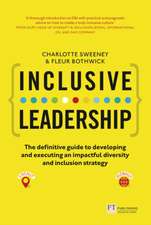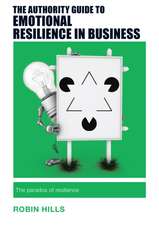The Science of Leadership: Lessons from Research for Organizational Leaders
Autor Julian Barlingen Limba Engleză Hardback – 6 mar 2014
Preț: 456.82 lei
Preț vechi: 570.79 lei
-20% Nou
Puncte Express: 685
Preț estimativ în valută:
87.42€ • 90.93$ • 72.17£
87.42€ • 90.93$ • 72.17£
Carte disponibilă
Livrare economică 11-17 martie
Preluare comenzi: 021 569.72.76
Specificații
ISBN-13: 9780199757015
ISBN-10: 0199757011
Pagini: 344
Dimensiuni: 160 x 236 x 36 mm
Greutate: 0.57 kg
Editura: Oxford University Press
Colecția OUP USA
Locul publicării:New York, United States
ISBN-10: 0199757011
Pagini: 344
Dimensiuni: 160 x 236 x 36 mm
Greutate: 0.57 kg
Editura: Oxford University Press
Colecția OUP USA
Locul publicării:New York, United States
Recenzii
It's written in a way that is accessible to those who want to use this knowledge to guide their everyday behaviors and for practitioners that want to use it design leadership programs. The book offers a thorough history of leadership theory and the data to support where leadership development initiatives have had success. This is a must read for human resource and leadership development practitioners to understand what we know and still are investigating around leadership.
The result of this emphasis on current trends in leadership research is that the evidence that Barling draws upon resonates with the current events and issues that are exemplified throughout the book.
The result of this emphasis on current trends in leadership research is that the evidence that Barling draws upon resonates with the current events and issues that are exemplified throughout the book.
Notă biografică
Julian Barling is the Borden Chair of Leadership and Queens Research Chair at the Queen's School of Business. Barling is extensively involved in research, graduate teaching, and executive development focused on organizational leadership, and has received numerous awards for research and teaching. He was elected a Fellow of the Royal Society of Canada in 2002, and is a Fellow of the Society of Industrial and Organizational Psychology, the Association for Psychological Science, the European Association of Occupational Health Psychology, and the Canadian Psychological Society.













